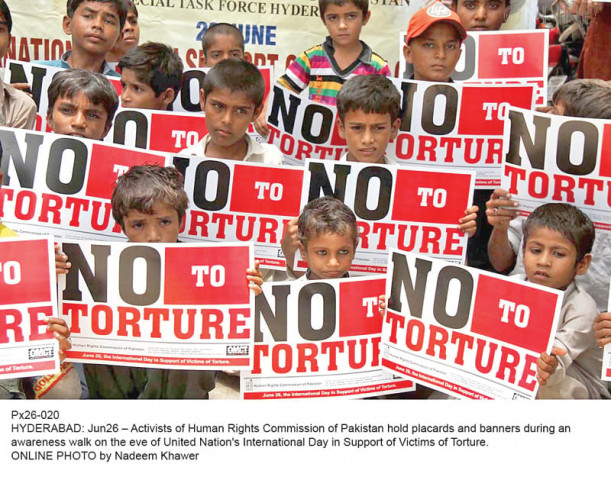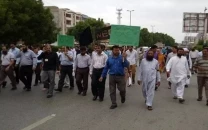Marking the day: We need laws against torture to protect citizens, say human rights activists
Politicians, lawyers, journalists also stress need for such legislation.

Human rights activists, politicians, lawyers and journalists agreed that such laws are the only way to protect the citizens from exploitation at the hands of state agencies. They were speaking at a seminar, 'Enact Laws Against Torture' at Karachi Press Club to mark the international Anti-Torture Day on Thursday.
The seminar was jointly organised by the Asian Human Rights Commission (AHRC), Pakistan Institute of Labour Education and Research (Piler), Human Rights Commission of Pakistan (HRCP), Sindh High Court Bar Association, Karachi Press Club, Karachi Bar Association (KBA) and the Pakistan Fisherfolk Forum (PFF).

Hassan Athar of AHRC said they are working in Asian countries to enact laws against torture. In Pakistan, a bill was prepared in 2012 but it has yet to be presented in the National Assembly, he pointed out. Some of the speakers were confused about what constitutes torture and kept lashing out at feudal lords for perpetuating violence. It was clarified then that the seminar only deals with torture against citizens by state agencies.
Karima Baloch, a vice-chairperson of the Baloch Students Federation Azad (BSO-Azad), said that 1,500 tortured bodies of both men and women have been found in Balochistan from mass graves and forests. "Every tortured and decayed body has its own story," she said, adding that all the bodies had 'Pakistan Zindabad' written on them.
A few Baloch elders seated on the back seats shouted slogans as she narrated the stories of the Baloch youth arrested and murdered. "Sometimes, we don't receive our dead in complete form; sometimes their internal organs are removed," she said as she appealed to the human rights organisations to raise their voices against torture and the arrest of the Baloch.
Senator Taj Haider called for formulating a "new political culture" in the country. Haider pointed out that certain political parties are against rigging in the general elections but no one has spoken about those who used guns and blasts to kick-out progressive parties from the parliament. "It is a lie that torture is needed to investigate a case," he said. "Forensic methods can be used along with other latest means to investigate instead of torturing suspects."
Muttahida Qaumi Movement (MQM)'s Haider Abbas Rizvi have the example of Pakistan's internal security crisis. "The pillars that were generated for its own protection and [to gain] strategic depth are killing Pakistanis," he claimed. Successive governments have been using torture as a tool against the opposition, he added.
Rizvi recalled the time when the 18th Amendment was being formulated and the MQM asked the committee to provide a constitutional guarantee through Article 10 that every citizen should be considered innocent until proven guilty by the court. "You would be surprised to know that no other political party was ready to give this concession to the citizens of Pakistan," he said.
Former president Asif Ali Zardari signed the UN Convention Against Torture and it is the responsibility of the state to make the necessary laws, said Rizvi. Instead, the government enacted the PPO, which is completely against the UN convention, he added before offering the MQM's services to table the bill in the parliament.
Piler joint director Zulfiqar Shah said the police figures show that 360 suspected criminals were killed during the targeted operation but they failed to show what type of investigations were made on these deaths.
PFF's Saeed Baloch, KPC president Imtiaz Khan Faran, HRCP vice-president Asad Iqbal Butt and psychiatrist Prof Dr Haroon Ahmed also shed light on the use of torture by state agencies and its impact on a man's personality, mental health and his future. They also highlighted how the state agencies justify their actions and demanded they disclose their tactics. Human Rights activist Akhtar Baloch presented a resolution demanding the enactment of laws against torture and the elimination of private torture cells of the police. The resolution was passed unanimously.
Published in The Express Tribune, June 28th, 2014.



















COMMENTS
Comments are moderated and generally will be posted if they are on-topic and not abusive.
For more information, please see our Comments FAQ